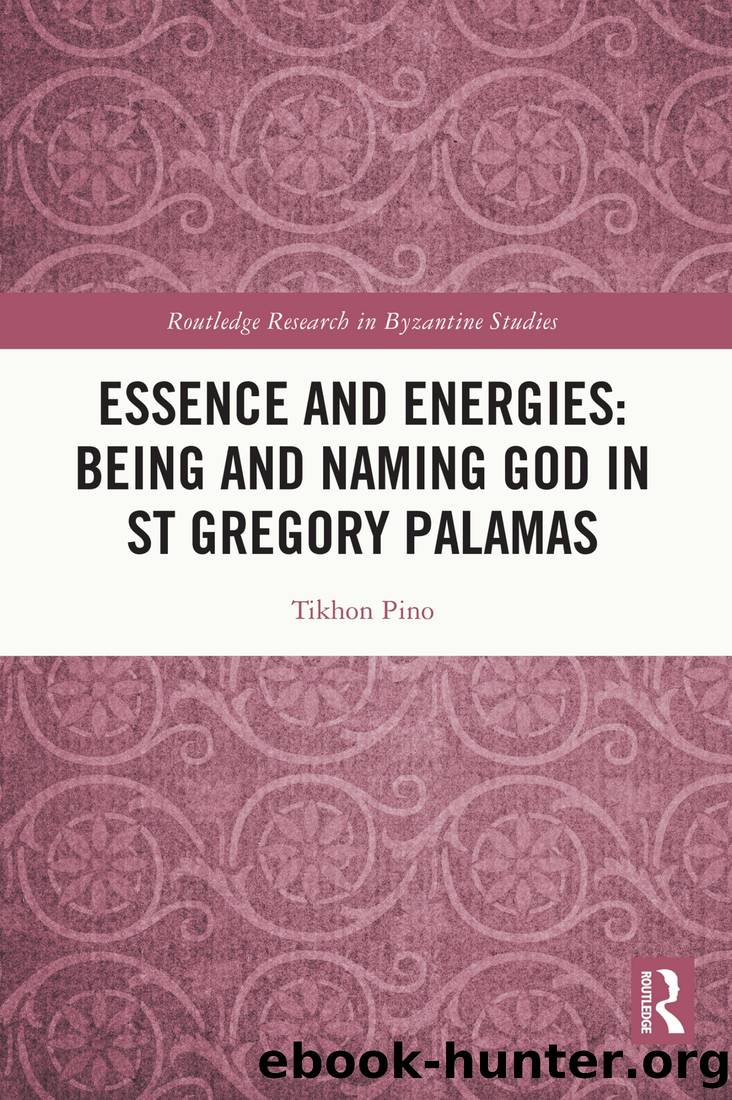Essence and Energies: Being and Naming God in St Gregory Palamas by Tikhon Pino;

Author:Tikhon Pino; [Pino, Tikhon]
Language: eng
Format: epub
ISBN: 9781000684643
Publisher: TaylorFrancis
Published: 2022-09-15T00:00:00+00:00
4
Distinguishing Essence and Energies
DOI: 10.4324/9781003278757-5
Introduction
In the previous two chapters, we attempted to penetrate what St Gregory Palamas means by the term energies, analyzing both the broader lexicon for speaking of Godâs essential powers, perfections, and attributes, as well as the debate surrounding their definition as actualities, operations, and activities. In the present chapter, we turn to the ways that Palamas seeks to defend the distinction between essence and energies and how he attempts to prove that Godâs energies cannot be identified with the divine nature or substance.
Although the distinction between Godâs essence and energies formed but one element of a nexus of contested ideas in the prolonged contest between Gregory and his successive opponents, it was widely seen as the central and most important problem of the controversy. Given the opportunity, in 1355, to choose the starting point of a major public debate with Palamas in the presence of the emperor, Nikephoros Gregoras opted to begin the discussion not with the problem of the Thaboric light or the experience of the hesychasts but with the embattled distinction that has since become synonymous with the name of Palamas. âThe Philosopher,â the report states, âbegan with the essence and energy of God, saying that there was no difference between them, since everything that is different from the essence is a creature.â1 Yet how exactly did Palamas counter this position? Voluminous though the secondary literature on St Gregory Palamas has been, a complete overview of the logic and argumentation used by Palamas to establish and defend the distinction between essence and energies has not, to date, been undertaken by scholars. The present chapter therefore seeks to fill this gap by outlining and collating the many arguments, syllogisms, and proofs that Palamas articulates throughout his corpus to show that Godâs essential attributes and powers cannot be identical to âwhatâ God is. Although it cannot pretend to offer a complete catalog of Gregoryâs myriad arguments, it attempts to cover the main lines and themes that govern his discourse throughout his career.
The terminology for the âdistinctionâ between essence and energies centers, especially, on the language of difference (διαÏοÏά, διαÏÎÏειν, διενηνοÏÎναι)2 as well as the language of otherness so that essence is one thing and energy another (á¼ÏεÏον καὶ á¼ÏεÏον, á¼Î»Î»Î¿ καὶ á¼Î»Î»Î¿). For Palamas, the two are not identical, or one and the same thing (Ïαá½ÏÏν), in the sense of being interchangeable or reducible one to the other. The majority of Gregoryâs arguments for why this must be are repeated consistently, in one form or another, throughout his career. As a whole, they can be grouped into five categories, representing the primary motivations for distinguishing between Godâs essential attributes and the essence in which they inhere. The first two categories center on the problem of antinomy, or the coincidence of opposites in God. The term antinomy itself is a modern designation and one that is not without controversy. Polycarp Sherwood, in his critique of Neo-Palamite theology notes that the term as it is used today âis current ⦠only from the time of Kant.
Download
This site does not store any files on its server. We only index and link to content provided by other sites. Please contact the content providers to delete copyright contents if any and email us, we'll remove relevant links or contents immediately.
| Amish | Catholicism |
| Christian Science | Jehovah's Witness |
| Mennonite | Messianic Judaism |
| Mormonism | Orthodoxy |
| Protestantism |
Under the Banner of Heaven: A Story of Violent Faith by Jon Krakauer(1687)
The Early Centuries - Byzantium 01 by John Julius Norwich(1655)
The Amish by Steven M. Nolt(1492)
Taken by J. C. Owens(1486)
In Spirit and Truth (In Spiritu Et Veritate Series) by Reed Zoe(1477)
Play It as It Lays by Joan Didion(1435)
The Apogee - Byzantium 02 by John Julius Norwich(1367)
The Last Man in Russia by Oliver Bullough(1325)
A History of the Amish by Steven M. Nolt(1217)
David Sedaris Diaries by David Sedaris(1167)
Leaving the Witness by Amber Scorah(1156)
Tears of the Silenced: A True Crime and an American Tragedy; Severe Child Abuse and Leaving the Amish by Misty Griffin(1142)
Fallen by unknow(1132)
The Dance of Change by unknow(1097)
The Angel of Forest Hill by Cindy Woodsmall(1082)
The Best of Amish Cooking by Phyllis Pellman Good(1077)
The Ariana Trilogy by Rachel Ann Nunes(1071)
Deep Blue by unknow(1063)
Escape by Carolyn Jessop & Laura Palmer(1055)
